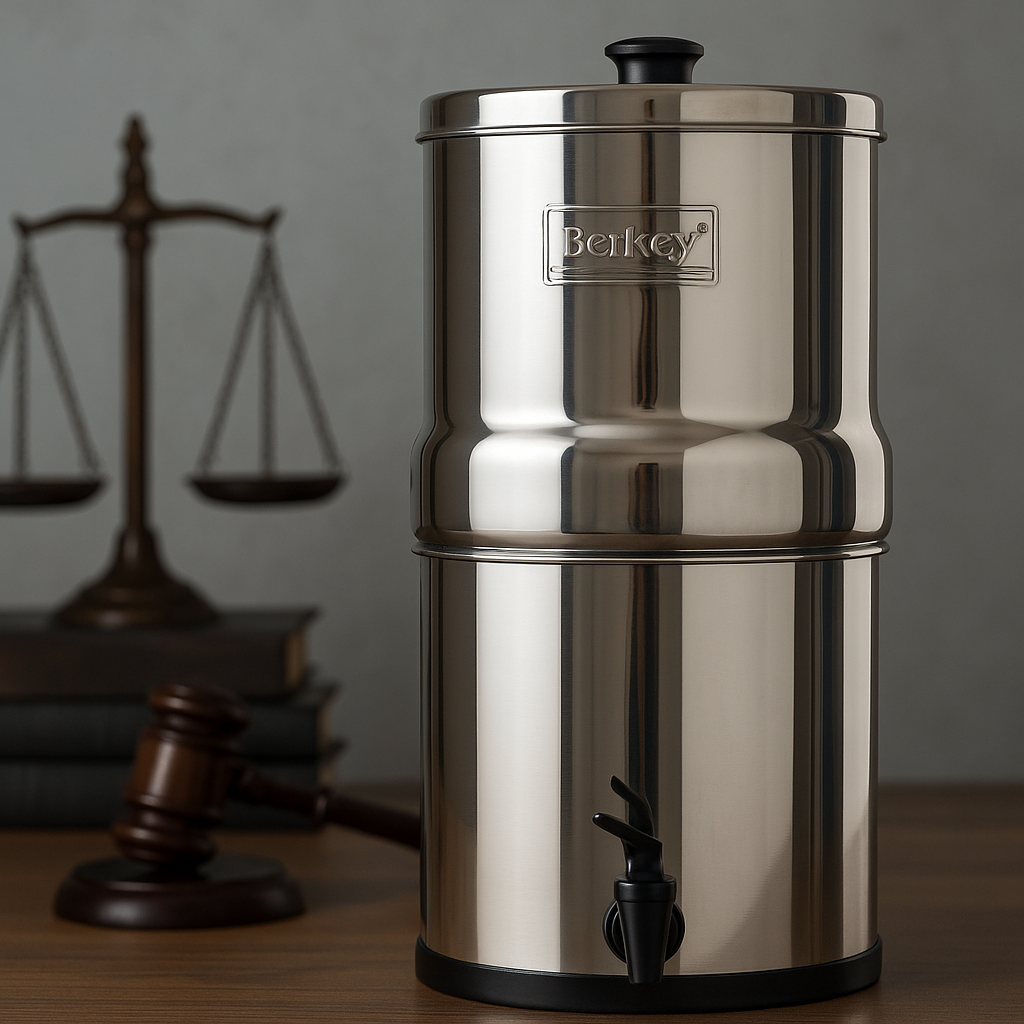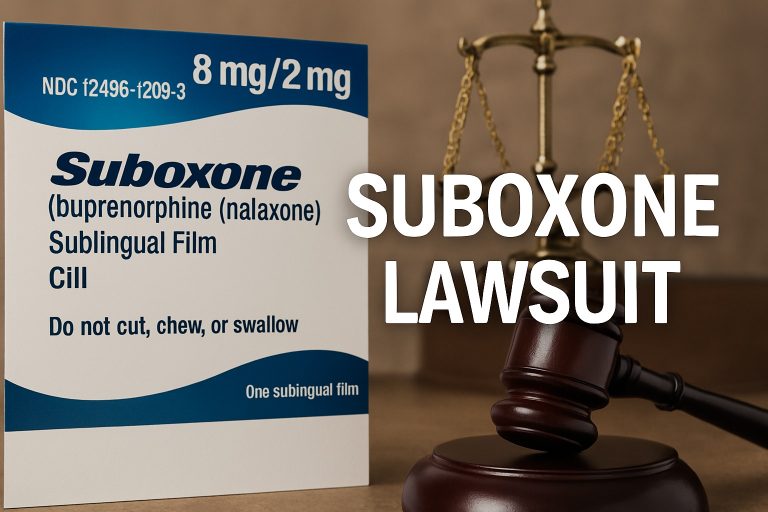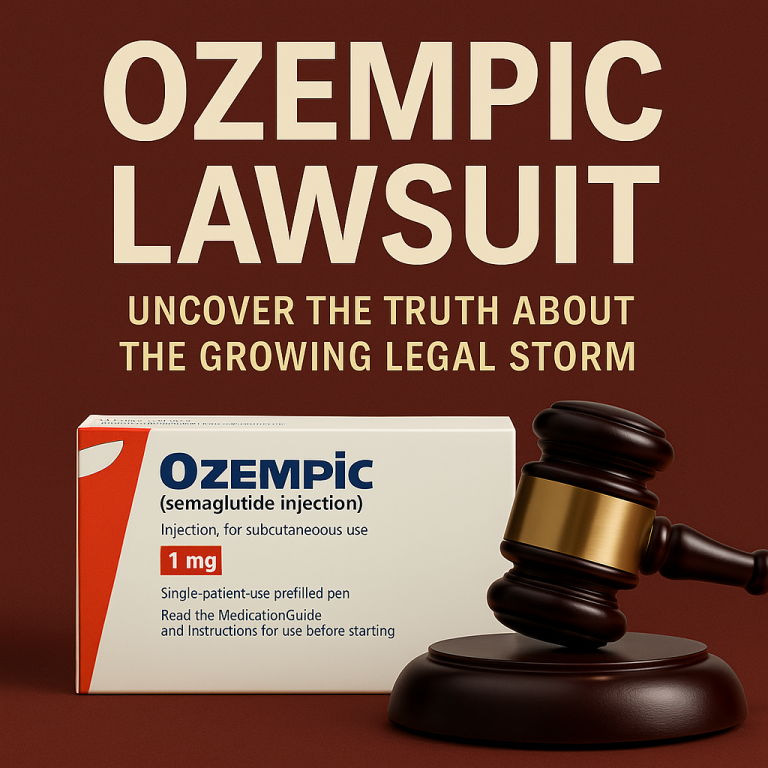The Berkey Water Filter Lawsuit is reshaping the water filtration market. For years, Berkey filters were trusted by millions of households. In 2023, that trust faced a challenge when the U.S. Environmental Protection Agency (EPA) targeted Berkey filters for regulatory action.
The EPA classified these filters as pesticidal devices because of their use of bacteriostatic silver. In response, Berkey’s parent company, New Millennium Concepts, Ltd. (NMCL), filed a lawsuit against the agency. The legal dispute has already caused product bans, market confusion, and millions in lost sales.
Now, consumers and businesses alike want clear answers. Are Berkey filters still safe? Will they remain available? What will this lawsuit mean for the entire water filtration industry? This comprehensive article explains the Berkey Water Filter Lawsuit in full. You’ll find the latest facts, key legal arguments, market impacts, and what to expect next.
What Triggered the Berkey Water Filter Lawsuit?
The start of the Berkey Water Filter Lawsuit lies in a simple but controversial regulatory decision. The EPA ruled that Berkey’s water filters contain a pesticidal component. This ruling, based on bacteriostatic silver in the filters, launched a wave of legal, commercial, and consumer consequences. Let’s break this down in detail.
EPA Classifies Berkey Filters as Pesticidal Devices
In early 2023, the EPA began its scrutiny. After reviewing Berkey’s product design, they concluded, based on public records, that Berkey filters use bacteriostatic silver in their filters, and silver prevents bacterial growth. Because of that, the EPA asserted that the filters needed to be registered as pesticidal devices under the Federal Insecticide, Fungicide, and Rodenticide Act (FIFRA).
By classifying Berkey filters in the same category as chemical pesticides, the EPA sparked controversy.
Widespread Product Bans Followed
The EPA’s classification triggered enforcement actions across the U.S. State regulators and online marketplaces reacted quickly, banning Berkey products in multiple regions:
California — historically one of the strictest states regarding water filtration standards.
Iowa — enforced EPA guidance and blocked Berkey sales.
Other Northeastern states — imposed regional restrictions based on EPA communications.
Additionally, major e-commerce platforms such as Amazon and eBay removed Berkey product listings.
NMCL Responds with a Federal Lawsuit
Faced with severe business disruption, NMCL filed the Berkey Water Filter Lawsuit in September 2023. The lawsuit, filed in Texas federal court, challenges the EPA’s decision and seeks to prevent further regulatory action.
Why Does the EPA Want to Regulate Berkey Filters?
Understanding the EPA’s rationale helps clarify the stakes in this lawsuit. The agency insists that Berkey’s use of bacteriostatic silver triggers federal oversight. However, NMCL believes the EPA is misinterpreting the law. Below, we explore both sides of this debate.
The Role of Bacteriostatic Silver
At the center of this legal fight is bacteriostatic silver—a material used within Berkey filters. The silver serves a specific purpose:
It prevents bacterial growth on the filter surface itself.
It extends the lifespan of the filter by limiting microbial contamination.
It is not intended to kill bacteria in the filtered water.
The EPA argues that this silver function meets FIFRA’s definition of a pesticidal device, triggering regulatory oversight.
The EPA’s Legal Argument Explained
The EPA claims that:
The filters include a pesticidal substance (silver ions).
Any product using such a substance requires EPA registration.
Berkey’s failure to register the filters violates federal law.
This interpretation would force NMCL to undergo a costly and time-consuming registration process—one traditionally reserved for chemical products.
NMCL’s Counterarguments
NMCL rejects this classification, stating that:
Their filters rely on gravity and mechanical filtration to remove contaminants.
Silver’s role is limited to preserving the filter media, not treating drinking water.
The EPA is applying an overly broad interpretation of FIFRA.
The outcome of the Berkey Water Filter Lawsuit will determine which legal view prevails.
What Are the Key Allegations in the Berkey Water Filter Lawsuit?
To understand NMCL’s legal position, you need to examine its core allegations. The company claims that the EPA’s actions are both legally and procedurally flawed. Here’s a detailed look at the allegations driving the Berkey Water Filter Lawsuit.
NMCL’s Allegations Against the EPA
The core allegations in the Berkey Water Filter Lawsuit include the following:
1. The EPA Is Acting Arbitrarily and Capriciously
NMCL argues that the EPA’s actions lack consistency and fairness. Other similar filtration products on the market use bacteriostatic materials without facing the same regulatory treatment.
2. The EPA Is Exceeding Its Legal Authority
The lawsuit claims that the EPA is overreaching its legal mandate. FIFRA was never intended to regulate mechanical water filters, NMCL argues.
3. NMCL Has Suffered Irreparable Harm
The company claims significant damages:
Loss of access to major markets due to state-level bans.
Loss of sales on e-commerce platforms such as Amazon and eBay.
Damage to brand reputation, with consumers questioning product legality.
Estimated millions of dollars in lost revenue.
The Core Legal Question
Ultimately, the lawsuit centers on one question:
Does bacteriostatic silver in a water filter media qualify the product as a pesticidal device under FIFRA?
The answer will have lasting consequences for both Berkey and the broader water filtration industry.
What Is the Current Status of the Berkey Water Filter Lawsuit?
The legal process surrounding the Berkey Water Filter Lawsuit is complex and evolving. As the case moves through court, temporary rulings and market reactions continue to shape outcomes. Here is where things currently stand.
Legal Proceedings Are Ongoing
As of mid-2024, the Berkey Water Filter Lawsuit remains active in Texas federal court. And still in the 2025 it is ongoing. Both sides are presenting legal arguments, and the court has yet to issue a final ruling.
Temporary Injunctions Provide Limited Relief
Some Berkey distributors have secured temporary injunctions allowing them to resume sales in select states. However, significant restrictions still apply across much of the U.S.
Current Sales Status
| Sales Channel | Status (Mid-2024) |
|---|---|
| Direct from NMCL | Limited sales ongoing |
| Authorized dealers | Some states blocked |
| Amazon | Listing blocked |
| eBay | Listing blocked |
| International | Variable by country |
Market Confusion Persists
Despite temporary legal relief, consumers remain unsure:
Is it legal to buy a Berkey filter in my state?
Will the filters remain available long-term?
Is this product safe and compliant?
These questions continue to drive market uncertainty.
How Has the Market Reacted to the Berkey Water Filter Lawsuit?
The Berkey Water Filter Lawsuit has reshaped the market for gravity-based water filters. As Berkey’s position weakened, competitors seized the opportunity to gain visibility and trust. Let’s examine how the market has shifted.
Sales Disruptions Have Shifted Market Dynamics
The legal challenges have disrupted Berkey’s once-dominant market position. In response, competitors have moved quickly to capture market share.
Top Alternatives Gaining Popularity
Several brands are benefiting from Berkey’s troubles:
Propur — Offers gravity-based filters without bacteriostatic silver.
Alexapure — Competes directly with Berkey on performance claims.
AquaCera — Marketed as an EPA-compliant alternative.
ZeroWater — Focuses on heavy metals and TDS reduction.
Growing Consumer Concerns
Consumers are voicing multiple concerns:
Regulatory compliance — Will Berkey filters soon be illegal?
Safety — Is silver-based filtration safe for long-term use?
Industry impact — Will the EPA expand regulation to other filter brands?
As the Berkey Water Filter Lawsuit unfolds, these concerns remain top of mind.
What Are the Possible Outcomes of the Berkey Water Filter Lawsuit?
The future of Berkey’s business—and the entire gravity filter industry—depends on how the court rules. The possible outcomes of the Berkey Water Filter Lawsuit could dramatically reshape the market. Let’s explore these scenarios.
Court Ruling Scenarios
Several outcomes are possible:
The court could rule in favor of NMCL, confirming that Berkey filters do not require pesticide registration.
The court could side with the EPA, forcing NMCL to register filters under FIFRA or redesign the product.
The parties could reach a compromise settlement, possibly involving revised product labeling or silver usage changes.
Broader Industry Implications
The outcome of the Berkey Water Filter Lawsuit will set important precedents:
Other filtration brands may face new regulatory scrutiny.
The EPA’s scope of authority could be clarified—or limited.
Consumer confidence in silver-based filters could shift dramatically.
What Should Consumers Know About Berkey Filters Right Now?
Many consumers remain unsure about the legal and practical status of Berkey filters. If you currently own or plan to buy a Berkey product, here’s what you should know today.
Are Berkey Filters Safe?
Current evidence suggests that Berkey filters remain safe for consumer use:
The bacteriostatic silver is intended to protect the filter, not the water.
There is no verified risk of harmful silver levels in filtered water.
Can You Still Buy Berkey Filters?
Yes, but availability is mixed:
Direct sales from NMCL are still active in some states.
Many authorized dealers face sales restrictions.
Online availability on Amazon and eBay is currently blocked.
Should You Consider Alternatives?
If your state prohibits Berkey sales, viable alternatives include:
Propur — Uses different filtration technology.
Alexapure — Maintains strong gravity filtration performance.
AquaCera — Offers fluoride-reduction options.
ZeroWater — Provides NSF-certified heavy metal removal.
What Is the Latest News in the Berkey Water Filter Lawsuit?
The Berkey Water Filter Lawsuit continues to develop. Legal arguments are ongoing, and no final decision has been issued. Here’s the latest.
The latest updates (as of mid-2024) include:
The court case remains active with no final ruling issued.
Temporary injunctions have restored partial market access.
Legal analysts predict the case will likely extend into late 2024 or early 2025.
The EPA is defending its stance while facing public criticism of regulatory overreach.
What Compensation Is NMCL Seeking?
NMCL seeks multiple forms of relief in the Berkey Water Filter Lawsuit:
A court ruling that Berkey filters are not subject to FIFRA pesticide registration.
Monetary damages to compensate for lost sales and business harm.
Injunctions preventing further EPA interference without proper regulatory authority.
How Can You Stay Updated on the Berkey Water Filter Lawsuit?
The Berkey Water Filter Lawsuit remains dynamic. Staying informed is key for consumers and industry professionals alike.
Consumer Monitoring Tips
To stay informed, consumers should:
Follow official updates from NMCL’s website and newsletters.
Track coverage on trusted legal blogs such as CounselStack.
Read news reports from reliable consumer protection and environmental law outlets.
Conclusion
The Berkey Water Filter Lawsuit is a landmark case with far-reaching implications. It challenges the EPA’s ability to classify water filters as pesticidal devices based on internal materials—not on their primary function. At stake is not only Berkey’s market future but also the broader regulation of innovative water filtration products. As of now, Berkey filters remain legal to use. However, sales restrictions, legal uncertainty, and consumer confusion continue.
The outcome of the lawsuit will determine whether Berkey retains its ability to market and sell its products in a capacity similar to gravity water filters or whether it has to undergo a massive redesign of its product and regulatory compliance. No matter the outcome, there is no question that this lawsuit will influence the regulatory risk tolerances of all of the water filtration industry. Consumers should remain aware of the ongoing litigation, keep up to date with any legal developments, and make smart purchasing decisions going forward.
FAQs About the Berkey Water Filter Lawsuit
What is the Berkey Water Filter Lawsuit about?
The lawsuit challenges the EPA’s classification of Berkey filters as pesticidal devices due to bacteriostatic silver.
Why did the EPA classify Berkey filters as pesticidal devices?
The EPA claims that silver used in the filters meets the definition of a pesticidal substance under FIFRA.
Are Berkey filters still legal to use?
Yes. Consumers can continue to use existing Berkey filters without legal risk.
Can I still buy a new Berkey filter?
Yes, but availability varies by state. Sales on Amazon and eBay are blocked.
Ayesha Awais is a content writer for JudicialNexus.com, covering accident reports, injury-related news, lawsuits, and public safety updates. All content is informational in nature and based on publicly available sources.




